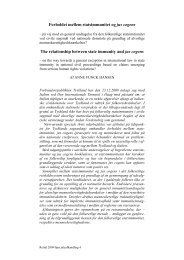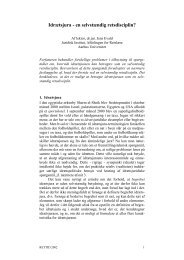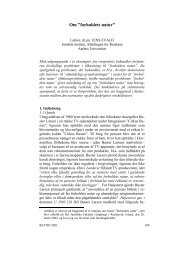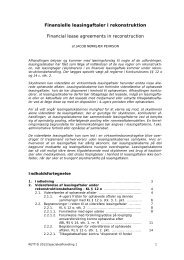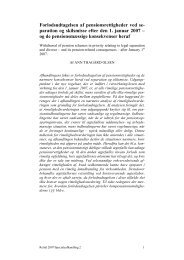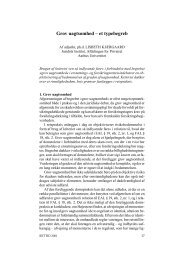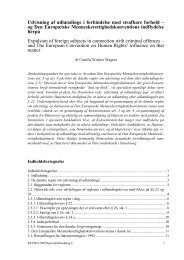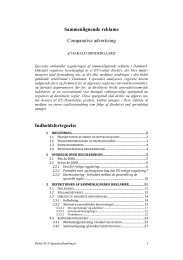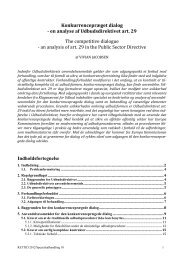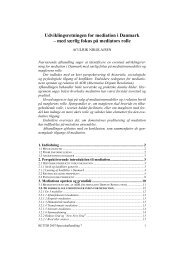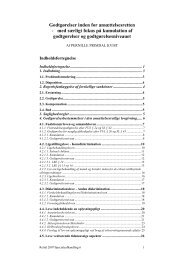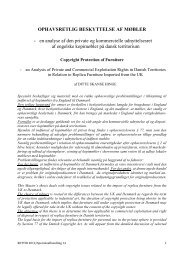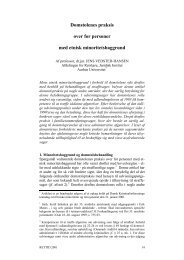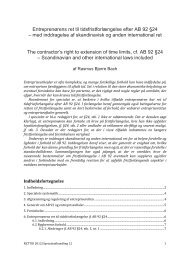Product liability under the CISG and Concurring tort law claims ...
Product liability under the CISG and Concurring tort law claims ...
Product liability under the CISG and Concurring tort law claims ...
Create successful ePaper yourself
Turn your PDF publications into a flip-book with our unique Google optimized e-Paper software.
4.4.2.1. The effect of <strong>the</strong> EC Directive on <strong>Product</strong> Liability<br />
The growing body of European private <strong>law</strong> results in more <strong>and</strong> more overlaps with <strong>the</strong> Convention. This<br />
raises <strong>the</strong> question of whe<strong>the</strong>r European legislation takes priority over <strong>the</strong> Convention or not?<br />
This question has been much debated, because allowing EC directives or regulations to take priority over<br />
<strong>the</strong> Convention will interfere with <strong>the</strong> well-balanced rules in <strong>the</strong> Convention <strong>and</strong> <strong>the</strong> main goal of achieving<br />
uniformity in international trade. It could lead to a split in <strong>the</strong> application of <strong>the</strong> Convention, depending on<br />
<strong>the</strong> court in which <strong>the</strong> suit has been filed. This in effect could have a devastating impact on <strong>the</strong> success of<br />
<strong>the</strong> Convention as an instrument in international trade.<br />
However, precedence must presumably be given to product <strong>liability</strong> <strong>law</strong>s based on <strong>the</strong> EC directive by virtue<br />
of art 90 <strong>CISG</strong>. Although a directive is not an international agreement as such, which is <strong>the</strong> requirement to<br />
enjoy priority according to art 90 <strong>CISG</strong>, it has its basis in <strong>the</strong> EC Treaties, which are international agreements.<br />
Because of this connection some scholars are of <strong>the</strong> opinion that directives are to be regarded as<br />
international agreements <strong>under</strong> art 90 <strong>CISG</strong> <strong>and</strong> consequently enjoy priority. 120<br />
It is this authors opinion that art 90 <strong>CISG</strong> should be construed narrowly because it represents an exception<br />
to <strong>the</strong> main rule in art 1 <strong>CISG</strong>, i.e. that <strong>the</strong> Convention governs contracts for <strong>the</strong> international sale of goods.<br />
This, coupled with <strong>the</strong> dangers of destroying <strong>the</strong> uniformity which <strong>the</strong> Convention represents, leads this author<br />
to <strong>the</strong> conclusion that caution should be taken before allowing directives <strong>and</strong> regulations to constitute<br />
international agreements.<br />
The EC <strong>Product</strong> Liability Directive of 25 th of July 1985 121 has been adopted by <strong>the</strong> member states of <strong>the</strong> European<br />
Union <strong>and</strong> product <strong>liability</strong> <strong>law</strong>s in <strong>the</strong>se states will, to a certain degree, be based on this directive.<br />
However, because <strong>the</strong> directive governs only death or personal injury to buyers <strong>and</strong> damage to consumer<br />
property, 122 <strong>the</strong> directive barely overlaps with <strong>the</strong> Convention which, as has been stated previously, does not<br />
govern death or personal injury cf. art 5 <strong>CISG</strong> nor consumer relations cf. art 2(a) <strong>CISG</strong>. 123<br />
Thus <strong>the</strong> question of whe<strong>the</strong>r EC <strong>law</strong> takes priority over <strong>the</strong> Convention does not merit much consideration<br />
in this <strong>the</strong>sis, since it does not have much practical relevance. Therefore, <strong>and</strong> after establishing that <strong>the</strong><br />
topic has a relatively small place in <strong>the</strong> product <strong>liability</strong> scheme, <strong>the</strong> issue will not be treated any fur<strong>the</strong>r.<br />
120 See Herber in Schlechtriem/Thomas page 51 para 14 <strong>and</strong> page 689 para 12, who is of <strong>the</strong> opinion that EC Directives<br />
are to be regarded as international agreements according to art 90 <strong>CISG</strong>, <strong>and</strong> Huber page 28 section bb) <strong>and</strong> Ferrari<br />
page 76-77 section VI, who arrive at <strong>the</strong> opposite conclusion because directives have to be transformed into national<br />
<strong>law</strong> to have effect. See also Schlechtriem, second edition page 922 para 12b <strong>and</strong> 13 who regards it as <strong>the</strong> most desirable<br />
solution to not view EC Directives as international agreements in order to protect <strong>the</strong> well-balanced regime of <strong>the</strong><br />
<strong>CISG</strong>, though admitting that it is difficult to find watertight reasons that will convince <strong>the</strong> European Court of Justice of<br />
this solution.<br />
121 EC Council Directive 85/374.<br />
122 Cf. art 9 of <strong>the</strong> Directive. Consequently, <strong>the</strong> directive does not govern damage to property owned by companies<br />
which is <strong>the</strong> relevant part governed by <strong>the</strong> Convention.<br />
123 Schlechtriem, second edition page 922 para 12a <strong>and</strong> Huber page 28 section bb) who both concurs with this authors<br />
conclusion.<br />
RETTID 2012/Specialeafh<strong>and</strong>ling 26 30



